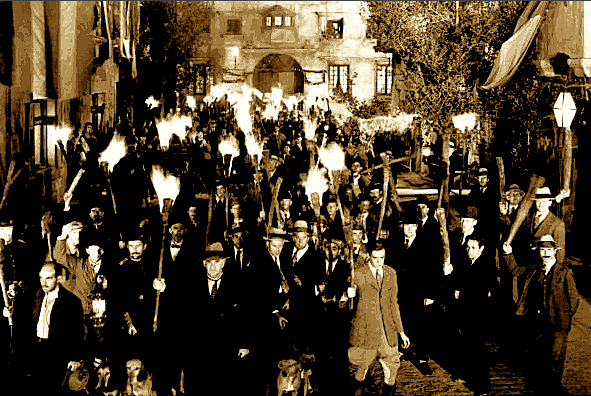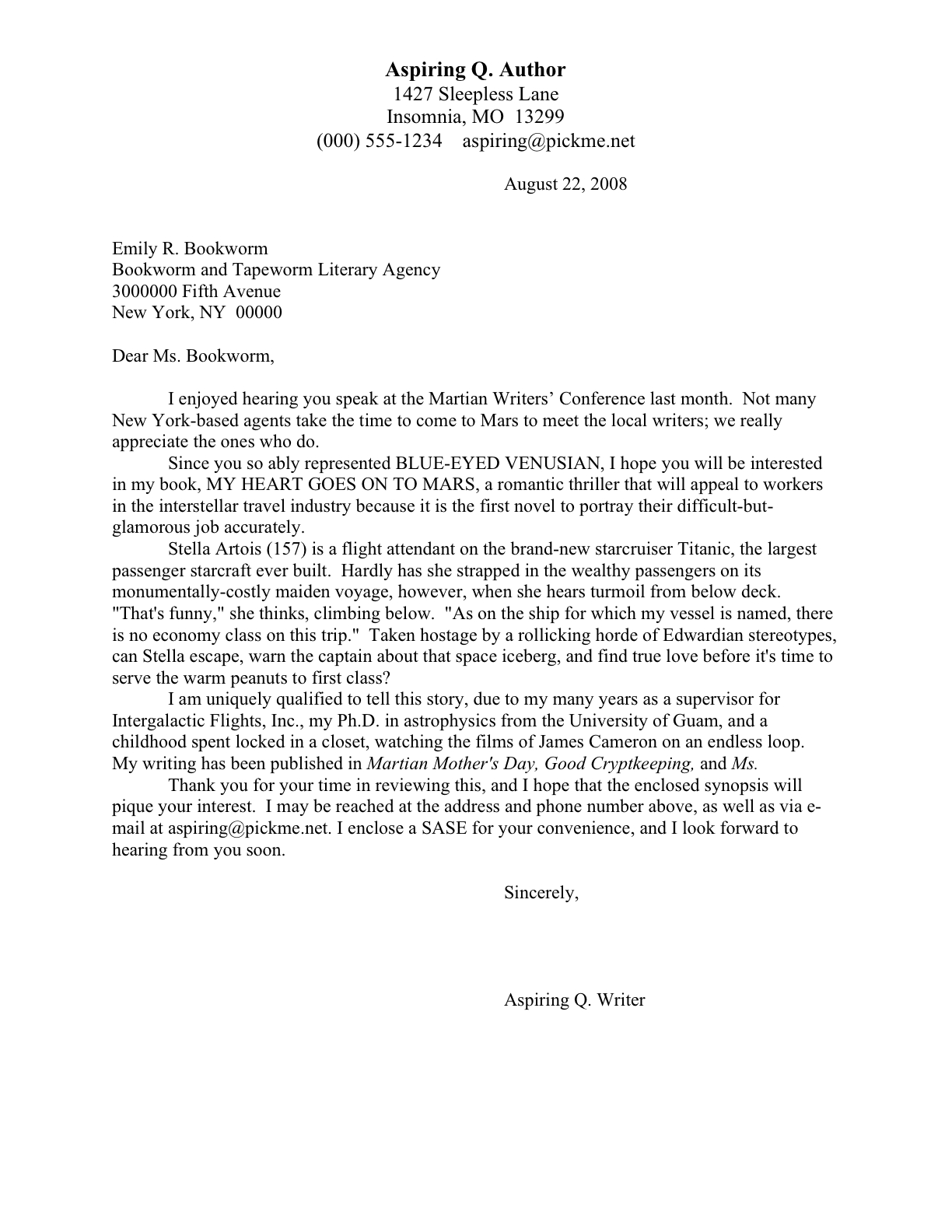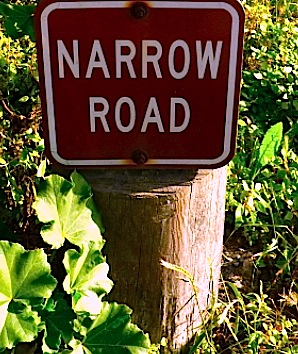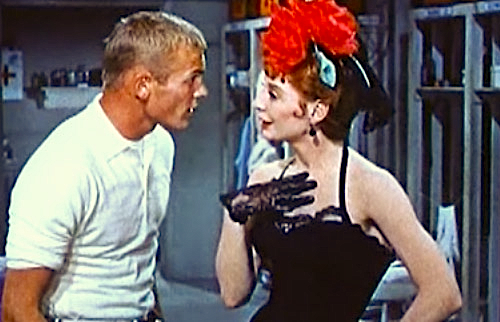Since I have been sneaking discussions of memoir craft and marketing — matters discussed thoughtfully online with astonishing rarity, for some reason — into our last few posts on querying, I would like to begin today with a commendation for reader Marc, who goes by the moniker Marc in MD on the Daily Kos. He’s been running a genuinely interesting and helpful series of posts there on the often frustrating and abstruse process of pulling together a nonfiction book proposal and sending it out to agents. In particular, I would strongly recommend his really good post on the process of figuring out what one’s book’s competition actually is to anyone even considering writing a proposal. Well done, Marc!
Speaking of memoir (again), I didn’t feel that I could close Queryfest’s examination of memoir querying without talking about a travel memoir. Travel memoir querying presents its own special joys challenges, does it not? On the bright side, it usually has a pretty well-defined story arc: the memoirist generally begins in an environment not too dissimilar from his target audience’s, travels to an environment quite dissimilar, then returns. Or doesn’t, as the mood and world events strike; there have been quite a few perfectly wonderful travel memoirs by writers who only returned to their native lands in book form. In any case, there’s a trajectory defined by Here, There, and how the protagonist was changed by the experience of moving between them.
That level of clarity about where to begin and end the book might well strike some non-travel memoirists as enviable. Not being sure what to include and what to glide past as summary is, after all, one of the fundamental dilemmas of the memoir trade. Few of us have been lucky enough to live lives featuring a self-evident story arc — or, thank goodness, unlucky enough to live ones in which every waking moment was stuffed to the gills with dramatic tension.
Let’s face it, just chronicling every event, meaningless and not, would be stultifying on the page. The art of memoir lies largely in selection, picking and choosing amongst the detritus of a life well lived to produce one heck of a story.
The travel memoirist must be selective as well, of course; the time she checked her luggage at J.F.K. is going to thrill readers considerably less, in all likelihood, than the incident in which she rescued that troupe of traveling acrobats from an angry mob of marauding squid. But the very fact of picking up and moving from one part of the globe to another automatically provides at least the rudiments of a dramatic structure.
Two roads may well have diverged in a yellow wood, but dag nab it, you didn’t travel both. You’re going to write about the one less traveled.
Yet at the querying stage, presenting that particular road’s appeal to our old pal, Millicent the agency screener, can be awfully difficult. And all too often, your garden-variety travel memoirist does not even realize that he needs to make the case that a reader will want to follow him — as opposed to any other traveler — through that yellow wood at all.
Those of you who just felt a wave of nausea washing over you are not in fact seasick. You’re merely savvy enough about memoir marketing to realize that I’m about to bring up the dreaded matter of platform.
Platform, for those of you new to the term, is the array of experience, credentials, research, and/or celebrity status (however defined) that makes a writer uniquely qualified to write a particular nonfiction book — and, equally important, will make potential readers believe s/he is the best person in the known universe to write it. In nonfiction circles, great writing generally is not enough to sell a book to a publisher; a great platform is usually necessary as well.
Why bring this unpleasant concept up now, you ask? Well, I hate to be the one to break it to all of you memoirists (but if I don’t, who will?), but at querying time, what’s going to convince Millicent that her boss, the agent of your dreams, absolutely needs to take a gander at your book proposal is not merely how beautifully you describe the story arc of your memoir, but your platform for writing it.
I sense many of you clutching at your hearts, gasping for breath, but honestly, saying that a nonfiction writer requires a platform is not as limiting as you may think. Platforms come in all shapes and sizes. Someone who has actually climbed K2, for instance, would be inherently more credible writing about the ascent experience than someone who had not, but then, a professor who had devoted the last 15 years to the study of mountaineering could also write authoritatively about it, merely from a different perspective. Then, too, a baby born halfway up might have some interesting things to say about the mother who bore her in transit, as would the journalist whose beat included interviewing everyone who made the ascent. And there’s just no denying that the movie star clambering a third of the way up in order to research a role might well be able to sell a few books about crampons.
My point, should you care to know it, is that contrary to perennial rumors endemic to the writers’ conference circuit, one does not have to be a celebrity in the appearing-on-a-sitcom sense in order to have a convincing platform for writing a particular story. Although even the most cursory glance at the memoirs currently gracing the shelves of a well-stocked bookstore will tell you that having appeared on TV certainly helps.
So does winning an Oscar. Or a presidential election. I’m guessing, though, that those fortunate enough already to be household names (or unfortunate enough, depending upon one’s perspective) are not much given to trawling the Internet for querying advice.
Legions of travel memoirists have had their hands raised patiently since I first brought up platform, I notice. “But Anne,” you intrepid souls protest, and who could blame you? “I have the best conceivable platform for my story: I actually lived it. I took the trip in question, and I happen to be talented enough to write about it exceedingly well. Since that’s self-evident — I could hardly have written about the experience, at least as nonfiction, had I not experienced it — I don’t need to worry about presenting a platform in my query, right?”
Oh, how many memoirists fall into that trap! And with good reason: it’s hard to argue that dear self is not the world’s leading authority on one’s own life.
But that’s true of any memoirist, right? If simply being a true story written by the person who lived it were sufficient to assure Millicent’s attention, all a memoir querier would have to do would be to say, “Hey, this is my story.”
And, indeed, that is more or less what most memoir queriers do. The result tends to look a bit like this — and, as always, if you’re having trouble reading this or any query example, try holding down the COMMAND key and pressing + to enlarge the image.
“Oh, come on, Anne,” those of you who haven’t been working your way through Queryfest scoff. “The average memoir query isn’t that bad.”
Okay, you caught me: it isn’t. The spelling is usually far worse.
Seriously, you’d be astounded at how often Millicent sees memoir queries with no sign of any platform at all. It’s not precisely that these memoirists are expecting her to guess why a reader predisposed to pick up a true story might grab the book being queried, as opposed to any other, off the bookstore shelf — but honestly, they might as well. Because, as you can see, poor Millie is left to speculate. Can you really blame her for assuming — correctly or not — that if the query doesn’t mention a platform, the writer doesn’t have one?
I hear you gulp, memoirists, but lest we forget, just because something really happened does not necessarily mean it will make gripping reading. Let’s go ahead and coin an aphorism: For a memoir query to be successful, it must make evident not only the premise of the story being told, but also why the storyteller is credible — and why a reader would want to read her tale.
That should not come as a tremendous surprise, I hope, to the Queryfest faithful. As we already know, a nonfiction query needs to contain all of the following elements:
1. The book’s title.
2. The book’s category, expressed in existing category terms. If the category does not make it apparent that the book is nonfiction, the query should say so.
3. A brief statement about why you are approaching this particular agent.
4. A descriptive paragraph or two, giving a compelling foretaste of the premise, plot, and/or argument of the book, ideally in a voice similar to the narrative’s.
5. A platform paragraph giving your writing credentials and/or expertise that renders you the ideal person to have written this book.
6. (Optional, but still a good idea.) A brief marketing paragraph explaining for whom you have written this book and why this book might appeal to that demographic in a way that no other book currently on the market does.
7. An EXTREMELY brief closing paragraph thanking the agent for considering the project.
8. The writer’s contact information in all cases, and a SASE if querying by mail.
Poor IB’s query above, as you may see, does not deliver on a number of these points. The letter is devoid of a platform paragraph, as well as any indication of the target readership. Millicent is left equally in the dark about why IB chose to query her boss at all. Instead, IB throws away valuable query space in informing her — repeatedly — of something that she already knows: that a memoir is, by definition, the true story of something that happened to the writer.
Travel memoirists fall into this particular trap quite often, and for precisely the same reason IB did: they don’t think about the necessity of establishing a platform. Why bother? Just as it is tempting to believe that being the person who actually lived through the described experiences is a sufficient platform for any memoir, with a travel memoir, the justification tends to be I came, I saw, I wrote about it.
To Millicent’s eye, however, that’s only the beginning. She also wants to know what makes this travel experience worthy of an entire book, rather than, say, an article or two? And if a particular traveling experience can indeed carry a 300-page memoir — and many can — what renders this traveler more qualified to write about it than another?
Well might you shift uncomfortably, travel memoirists. These are pretty pointed questions, ones that many memoirists would prefer not to address. “Why, it was an interesting experience!” these fine souls cry indignantly. “And I’m a good writer. Why shouldn’t I write about it?”
Calm down, indignant travelers: no one is saying that you shouldn’t delve in to the highly competitive (especially since EAT, PRAY, LOVE) travel memoir market. But at the risk of repeating myself, the mere fact that a talented writer happened to take a specific trip does not necessarily a strong memoir make. Yes, it all depends on the writing, but as with any nonfiction book, quality of the writing is not the only factor an agent would have to consider in weighing whether she can sell a proposal. She also has to consider platform, the array of credentials, name recognition, and experience that renders an author a credible author for that particular book — and that the publishing house can legitimately use to make that case to potential readers.
Yes, for a travel memoir, the writer does in fact need to have the trip in question and write about it well. Those are necessary qualifications, but not sufficient — and that comes as a great surprise to most first-time memoirists, whether or not they are writing about travel. Even though they produce book proposals, like any other aspiring nonfiction writer, they tend not to think of themselves as what they are in the publishing industry’s eyes: writers applying for the job of writing a particular book.
For that reason, a platform paragraph is as indispensable in a memoir query as in any other nonfiction query. Unless Millicent knows what your platform is, how can she assess whether you are the best conceivable author for this particular story?
Still, I sense some skepticism floating around out there in the ether. “Okay, Anne,” a travel memoirist pipes up, “I can see where that makes sense for your run-of-the-mill memoir, or even one for a relatively mundane trip. But I traveled to an exotic place! I saw amazing things! And, fortunately for my memoir’s story arc, I also did some darned interesting things! Surely, in my case, the story’s appeal would be self-evident to Millicent.”
I wouldn’t bet on that, traveling man; in order to request your book proposal, she’s still going to have to make the case to your boss that she might be able to sell your story. That’s true, I’m afraid, no matter how inherently fascinating a first-person travel account may be.
But some of you are not going to believe that, I see, until I give you a concrete example. And why should you?
Please join me, then, in considering a query submitted by brave, intrepid, and resourceful Author! Author! reader Dorothy Gale. (Not her real name, of course.) Clearly, Dorothy has many of the most laudable characteristics of the successful travel memoirists: not only did she take a wildly interesting trip to a far-off land, do many interesting things when she got there, and write about it, she also was courageous enough to volunteer her query for our scrutiny. That’s an author that I’d follow anywhere.
She has even written what the overwhelming majority of travel memoirists would consider a superlative query. It’s well-written, makes the trip sound legitimately fascinating, and seems to be targeted to the right agent. Take a gander:
I could quibble a bit about formatting — the date and closing are pretty far from the actual center of the page, and there is only one space after the colon in the title, rather than the requisite two — but you must admit, this sounds like one heck of a trip. Good job, Dorothy!
But is that going to be enough to wow Millicent? To answer that question, let’s whip out our list of query requisites again.
1. The book’s title: check.
2. The book’s category: check.
3. A brief statement about why you are approaching this particular agent: technically, yes, but the vagueness of because of your successful representation of books like… seems a trifle hesitant.
Also, does the repetitive structure of those first two sentences encourage Millicent to read on? Those of us who teach querying like to call this kind of phrasing a checklist opening: yes, all of the necessary elements are present, but they are introduced flatly, as if the writing style in a query didn’t matter.
It does matter, however, very much. Chant it with me, Queryfesters: every syllable of a query is a writing sample, just as much as every word of a submission is. Since agents can only judge writing talent by what’s in front of them, it’s reasonable to expect them to evaluate the query, as well as the synopsis and author bio, for writing quality.
Here, the checklist opening does not do justice to the writing in the rest of the query, let alone the book proposal or manuscript. Look how much stronger the query is if we vary the phrasing and remove the vagueness in that first paragraph — and, while we’re at it, correct those minor formatting quibbles.
More confident-sounding, isn’t it? I shan’t pretend, however, that reworking the wording didn’t require tightening the signature space considerably. Never fear; we shall address that down the line. In the meantime, let’s continue with our list of desirata.
4. A descriptive paragraph or two, giving a compelling foretaste of the premise, plot, and/or argument of the book, ideally in a voice similar to the narrative’s: this is the query’s strength, and what a strength it is! This description is stuffed to the gills with one-of-a-kind details. I’m delighted to see that Dorothy has done such a bang-up job on the single most important section of her query. Good job, Dot!
Again, we have the necessary element in spades, but does this presentation make the most of the story? To someone who reads as quickly as Millicent, cramming the entire story into a single paragraph is likely to result in some details getting lost. And to what does that line about research refer?
See what a difference it makes to break it up a little. And, because I can’t resist, to punch up the punctuation and tighten the phrasing a bit.
The story jumps off the page now, doesn’t it? Yet still I sense you are not entirely satisfied, you picky folks.
“But Anne!” the sharp-eyed among you cry, and rightly so. “It’s longer than a page now!”
Yes, I know. Didn’t I tell you we would be attending to that once we’d made sure Dorothy’s query included all of the requisite elements? Speaking of which, let’s move on.
5. A platform paragraph giving your writing credentials and/or expertise that renders you the ideal person to have written this book : not a sign of one, other than the obvious, the fact that Dorothy did the things she describes so well.
Again, is that enough? Possibly, but probably not. The case being made here should seem familiar by now: she came, she saw, she wrote about it. Or, as she puts it, because I lived in Nepal and speak fluent Nepali, I am able to bring this world alive from the inside out.
The reference to linguistic skills works well, but Millicent already knows that Dorothy lived in Nepal, doesn’t she? So is repeating it the best means of establishing her platform?
The thing is: I have no idea; it may be. As much as I would love to be able to whip up a convincing list of credentials for our Dorothy, I regret to say that I cannot: I don’t know what her platform is for this book. Her query did not tell me.
Sorry about that. I’m also sorry about the high probability that since Dorothy mentions no credentials, previous publications, or other platform elements, Millicent will simply assume that she doesn’t have any. Which I’m guessing isn’t actually the case here.
Again, though, I don’t know; the query does not provide the information I would need to make that assessment. While I could, for the sake of example, engage in some wildly irresponsible hypothesizing, that wouldn’t really help Dorothy improve her query, would it? Let’s proceed.
6. A brief marketing paragraph explaining for whom you have written this book and why this book might appeal to that demographic in a way that no other book currently on the market does: Dorothy did quite a nice job of this, I think. She makes an excellent case that quite a few potential readers travel to Nepal — and, by implication, might conceivably want to read about it before they go. It is a trifle strange, though, that the statistic she uses is two years old; a more recent statistic would have served the query better.
It’s entirely possible, of course, that this was simply the most recent statistic available when Dorothy wrote her query; it’s not unusual for tourism statistics to take a year or two to come out. What do you think, though, of her contention that only people who have made similar trips will be interested in her story? Do you think that’s the case?
Personally, I would be astounded if that were true; in my professional opinion, she’s limiting her target audience unnecessarily. In my experience, world travelers are not the only people who read travel memoirs. Indeed, the armchair traveler tends to read about many places she never visits in the flesh.
Who else might read this book? Well, for starters, presumably, for every person in the English-speaking world who actually makes it to Nepal, there are five, fifty, or a thousand individuals that want to go but lack the resources, time, and/or gumption, right? And would it be trite of me to suggest that some fraction of the already-established readership for books like the aforementioned EAT, PRAY, LOVE might have some interest in picking up a memoir like this?
I leave that one to your good judgment. But if you’ll permit my nudging your thought processes a little, may I remind you that people in the publishing industry tend to think of target audience in terms of who has a history of buying what kind of book?
7. A brief closing paragraph thanking the agent for considering the project: again, the required information is here, but I have to say, the wording feels a trifle abrupt to me.
Why? Well, that bit about the proposal is stating something that Millicent actually will find self-evident. Naturally, Dorothy will send a proposal, if Hawkeye asks for it; Millicent would simply assume that she would not be querying unless she had a completed proposal in hand. So why take up valuable query page space mentioning it?
Especially when, as the eagle-eyed have already pointed out, space is at a premium now. Let’s see if considering our final necessity will show us a way out of that predicament.
8. The writer’s contact information: yes, it’s here, in all of its glory. If only we could fit it on the page!
Happily, there’s a trick to this. Look at how much page space is freed up by the simple expedient of moving the querier’s contact information into the header.
More than enough, as you may see, to tinker with the last couple of paragraphs. The overall effect is pretty compelling, isn’t it?
“Ah,” you will say, “but you have not freed up enough room to add a platform paragraph. What do you plan to do about that, Anne?”
Me? Not a thing: as I said before, I just don’t know enough about Dorothy’s background to whip up a convincing platform paragraph. It’s possible — although, again, I suspect it’s unlikely — that the single best plank in that platform is precisely what she thought it was: that she had lived there.
If so, I would be reluctant to tinker further with this query; Millicent may well be willing to wait until she reads the proposal to learn the ins and outs of Dorothy’s platform. But see how a relatively small number of changes maximizes the argumentative impact of the case she was already making?
If she did decide to add a platform paragraph — and I’m hoping you do, Dot — she could free up the requisite lines in a couple of ways. In a pinch, she could get away with only three skipped lines, rather than four, for the signature (although a classically-trained Millicent would prefer that she didn’t). She could also lose a line of empty space between the date and Hawkeye’s address; there’s some extra space here.
There’s a final expedient that would free up even more room. Any guesses?
I’ll do better than tell you the answer to that question; I shall show you. Heck, I’ll even make up a platform paragraph from whole cloth, just to show you it’s possible to shoehorn one into this letter. Watch me:
Oodles of room, isn’t there? I could even add a reference to EAT, PRAY, LOVE, if I so chose.
Notice, please, that only two of the credentials in the faux platform paragraph are publications — and those are online. They also happen to be credits that Dorothy could self-induce, if you catch my drift.
Hey, if anything is stopping her from starting a blog to begin to attract an audience for her memoir, I certainly don’t know about it. Ditto for any insurmountable impediment to her contacting bloggers and webmasters of sites devoted to travel and asking them if they would be willing to host a charmingly-written guest post.
In case I’m being too subtle here: not having a boatload of previous publications in one’s dock does not mean a writer is platform-free. Be creative, and remember, these days, many writers don’t get paid for their first publication. The goal is to get people to read your writing — and to let Millicent know that they have.
But maybe a list of publications isn’t the best platform for your book, anyway. There’s more than one way to storm a castle, right?
Please join me in thanking Dorothy for her generosity in sharing her query, and in wishing her the best of luck in both her querying and continued travels. Keep up the good work!

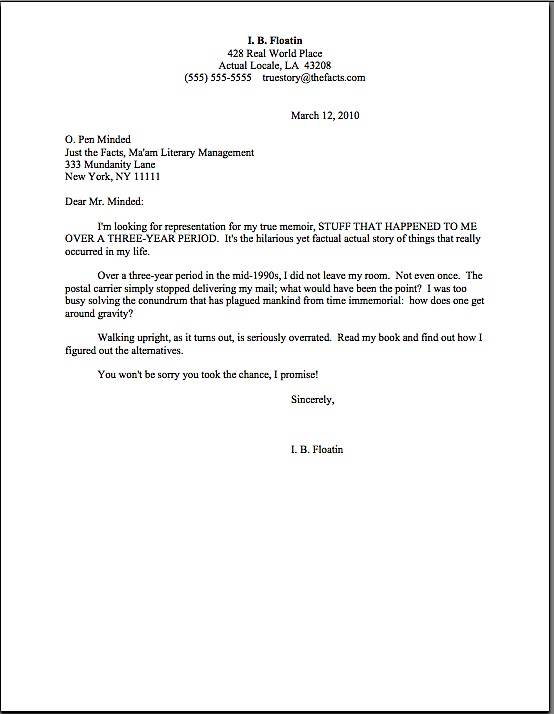
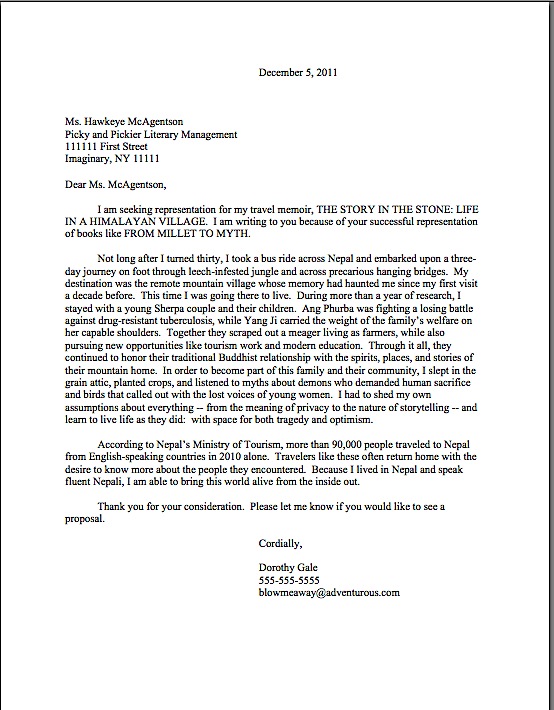
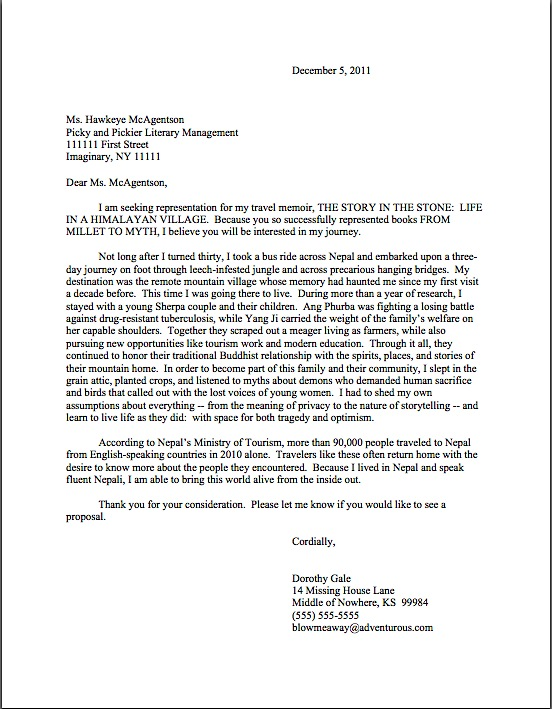
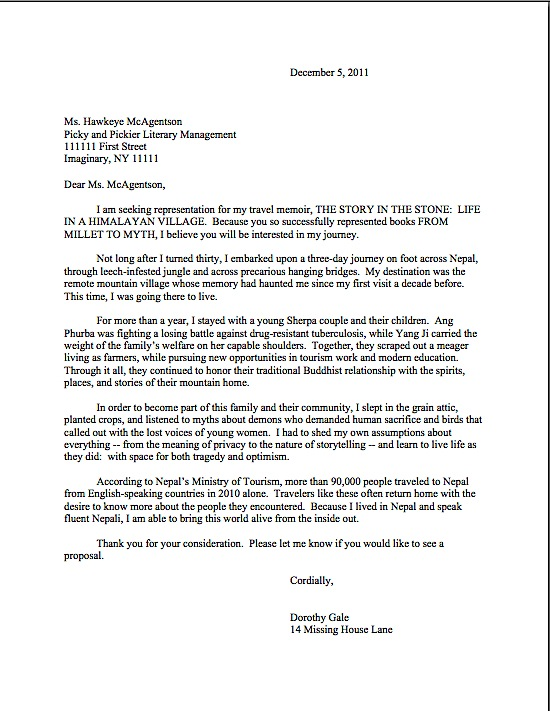
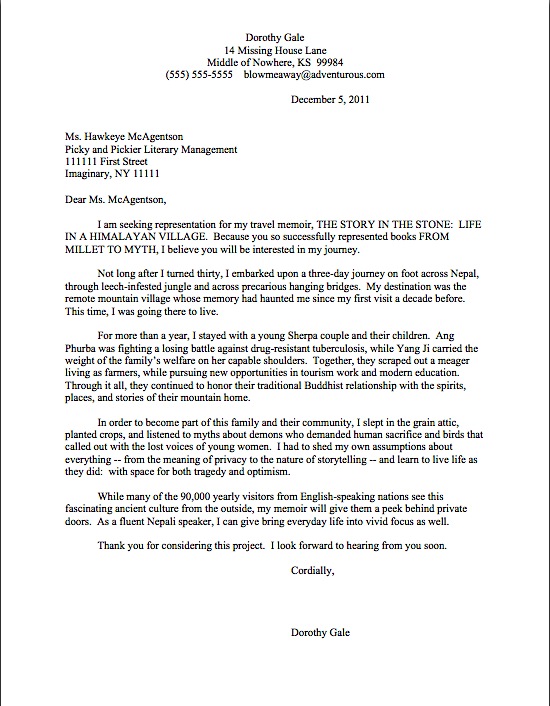
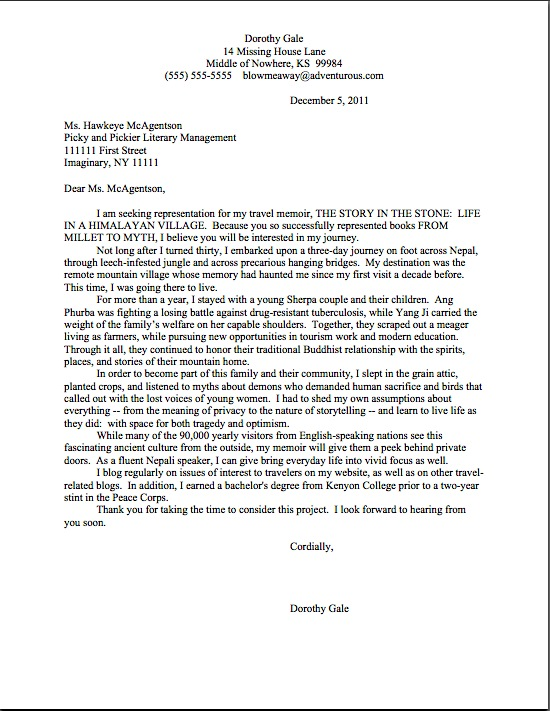






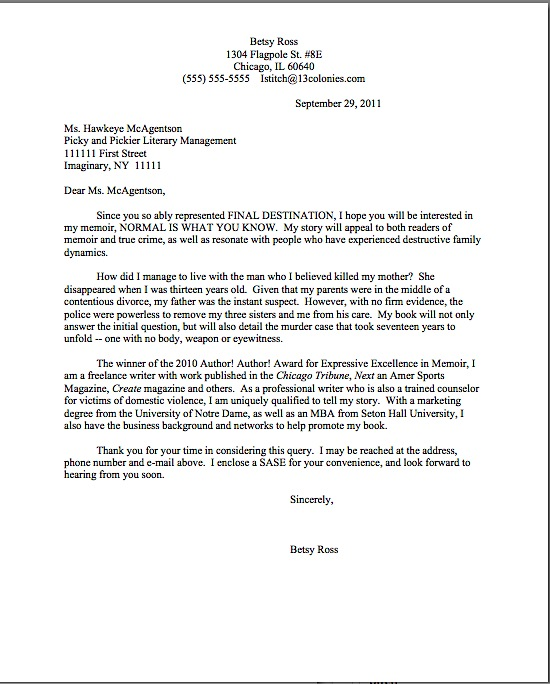
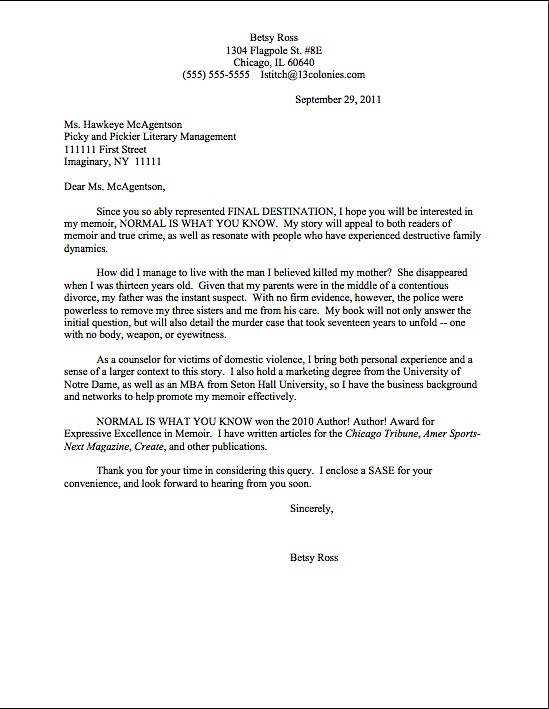
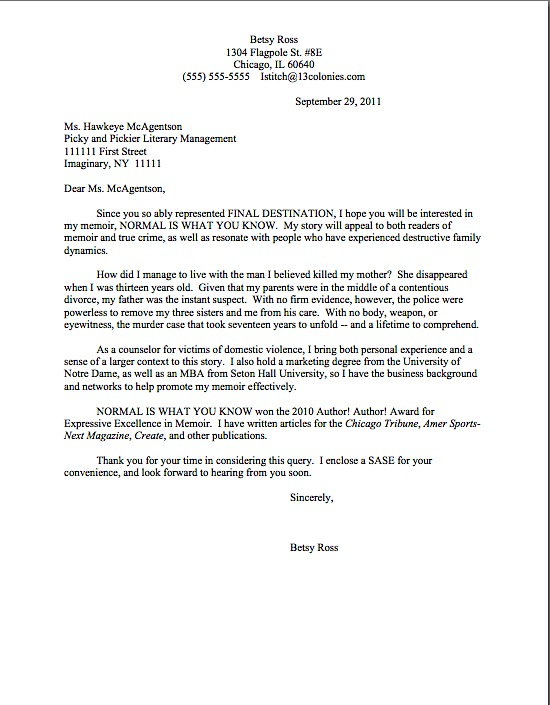
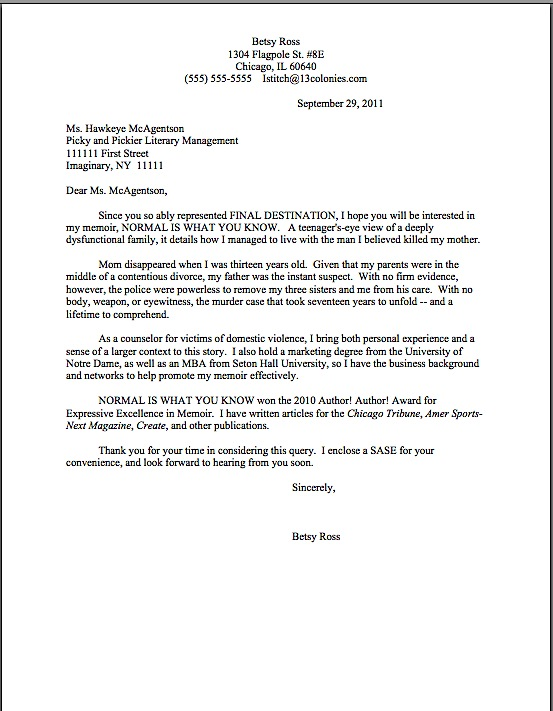
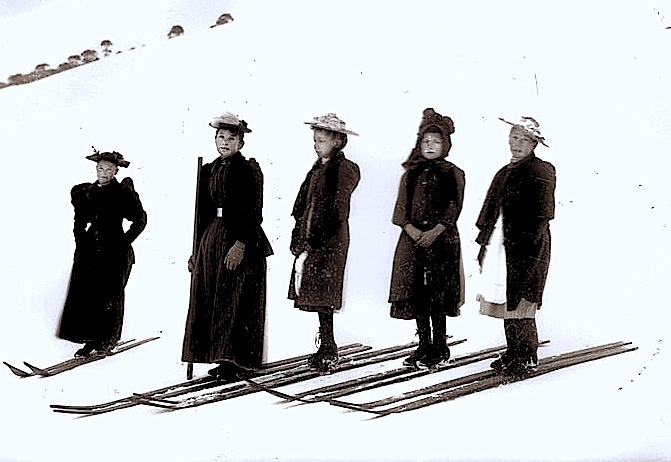
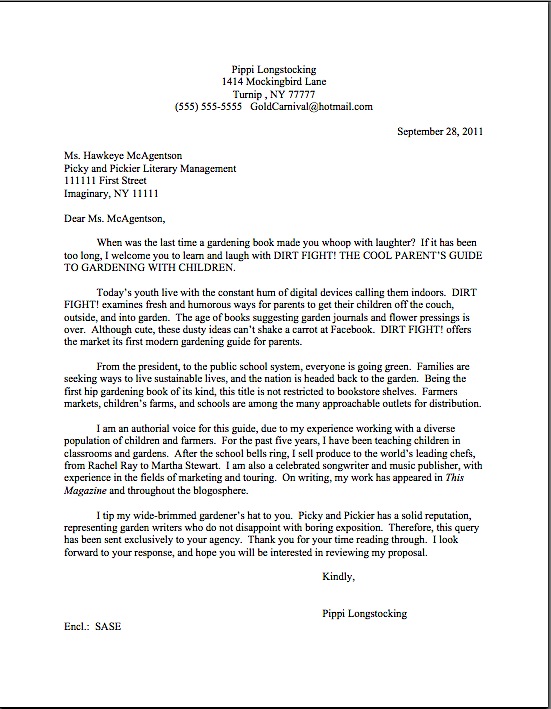
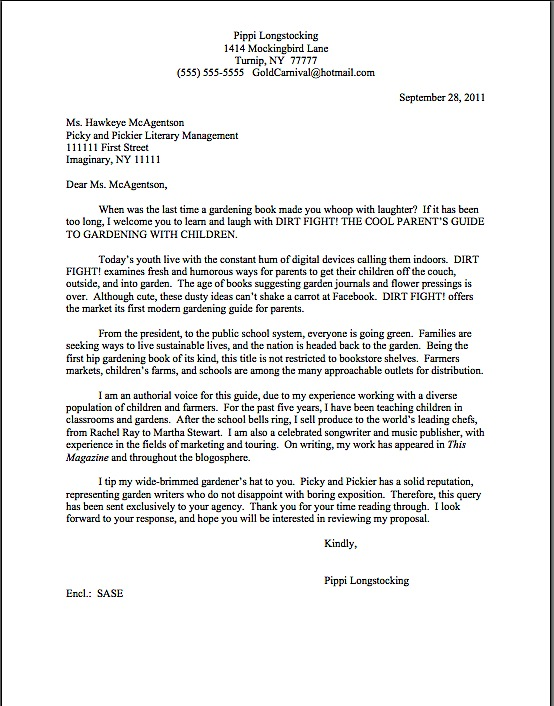
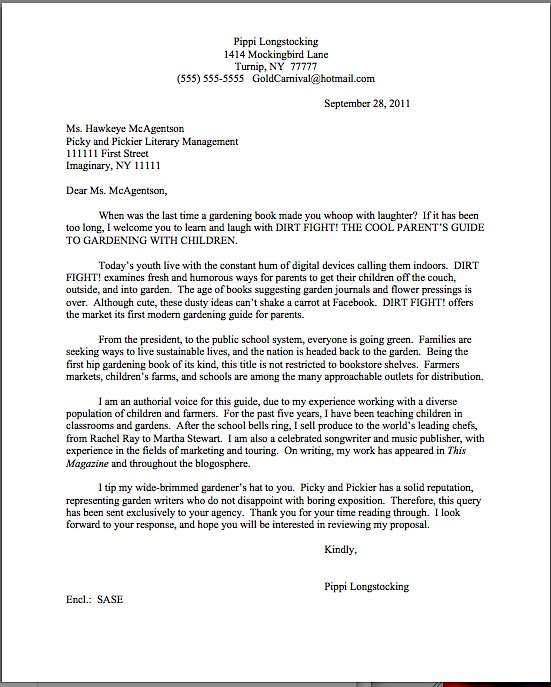
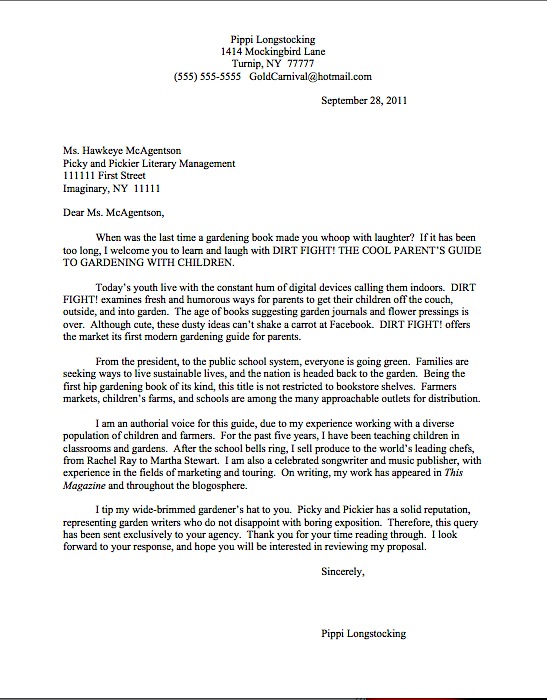
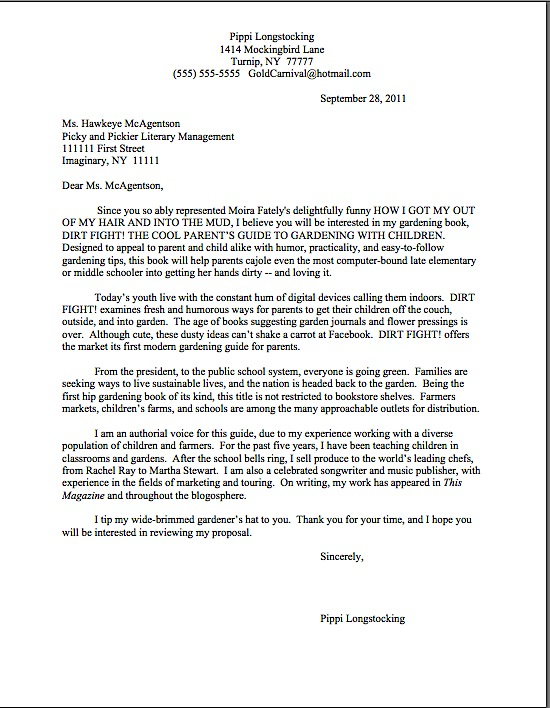
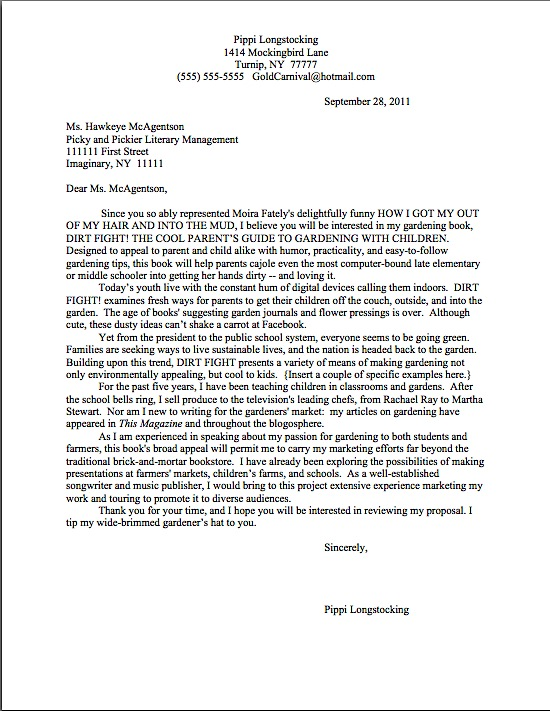

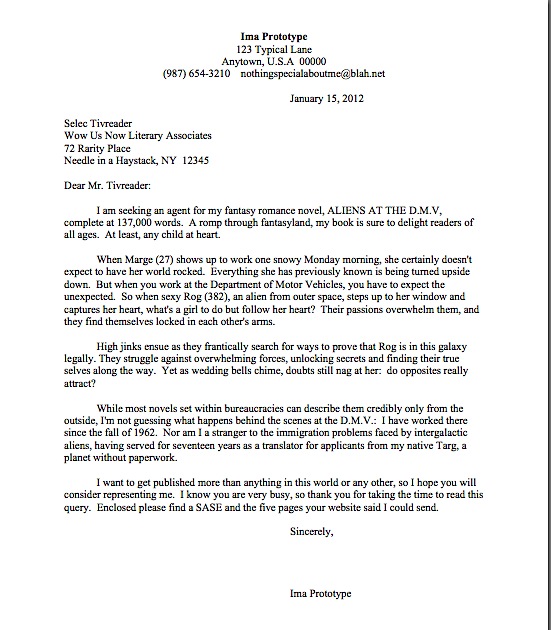



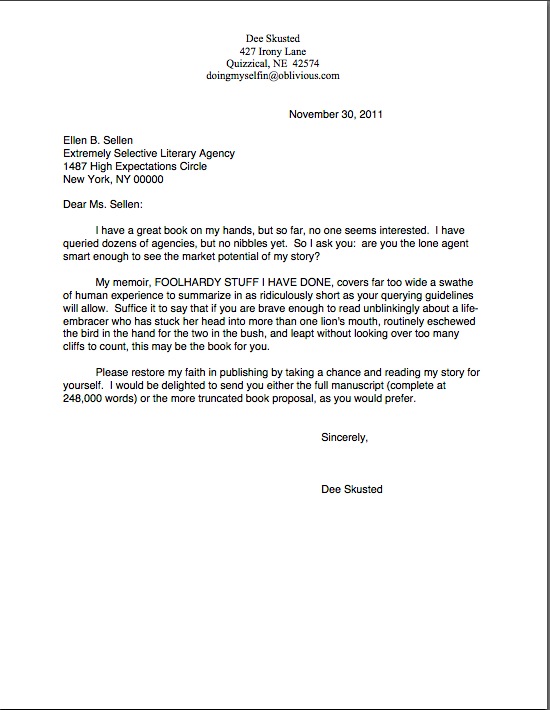
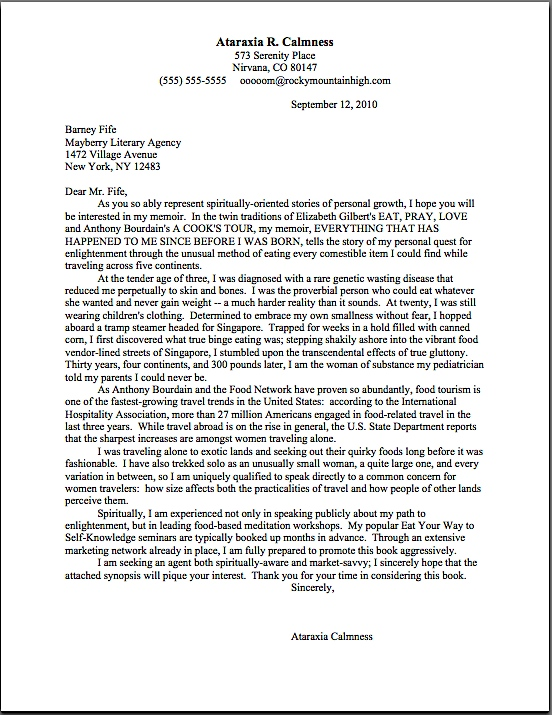
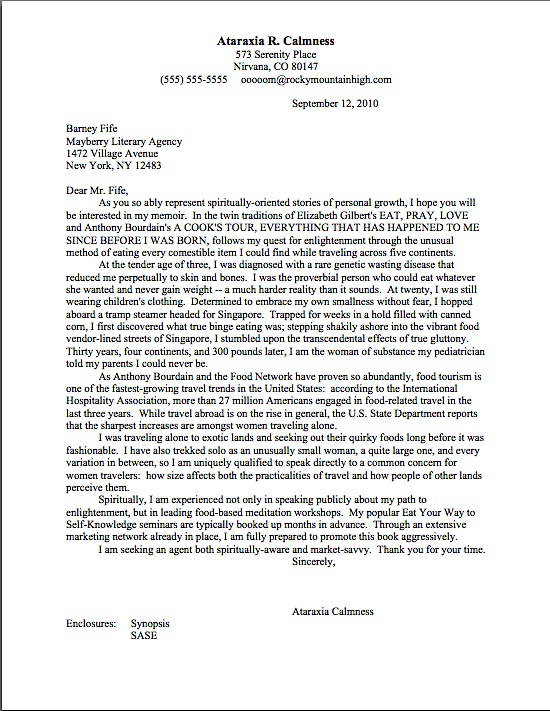
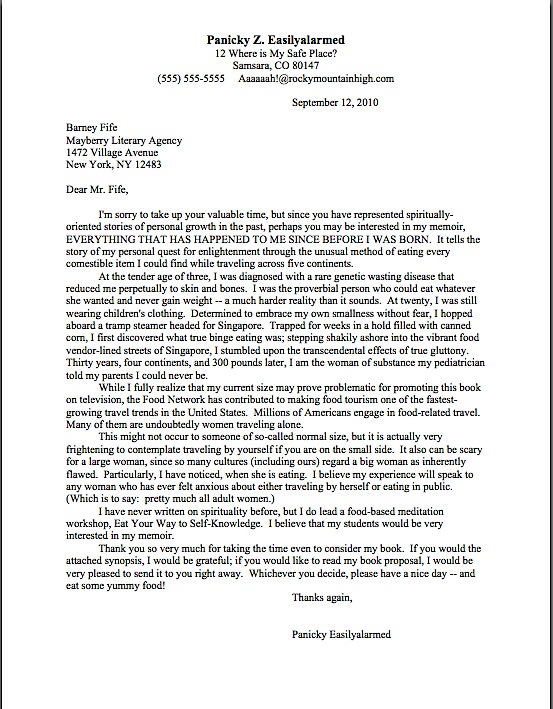
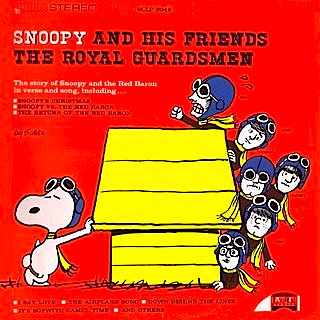
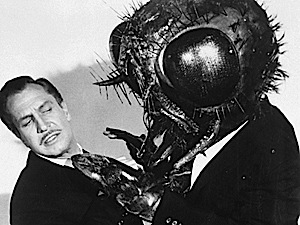

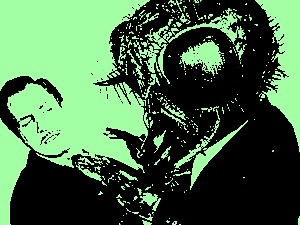
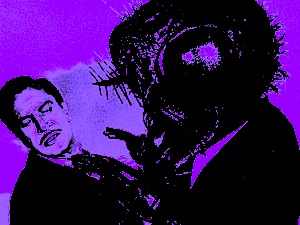
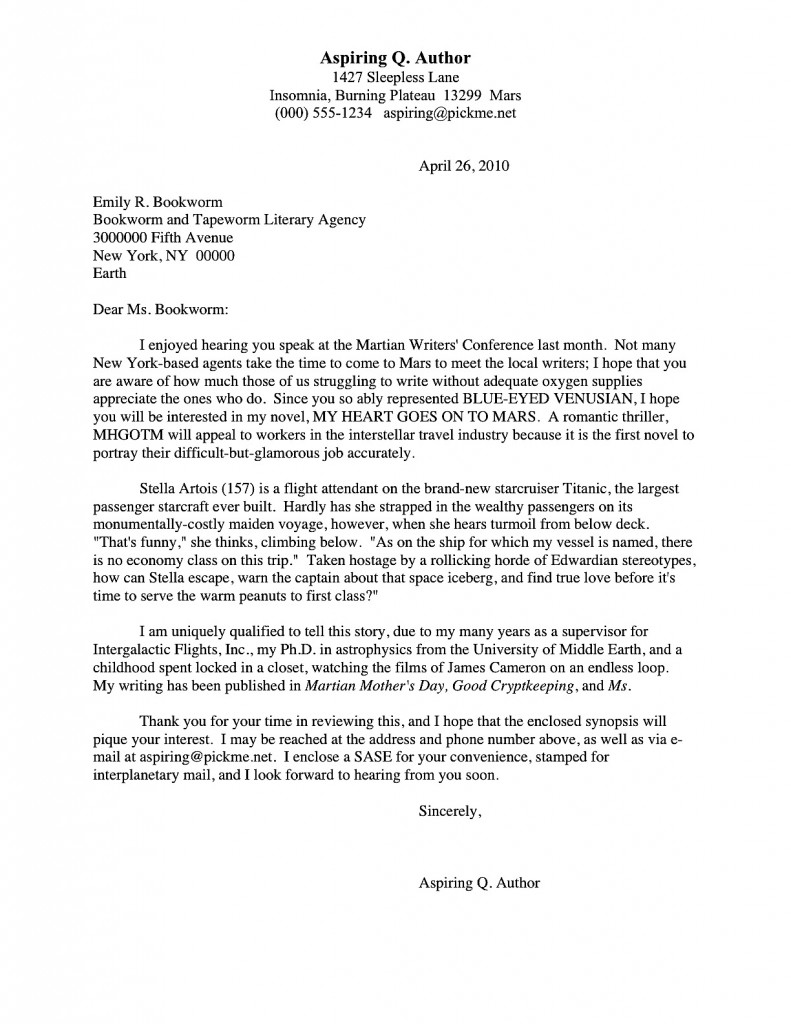
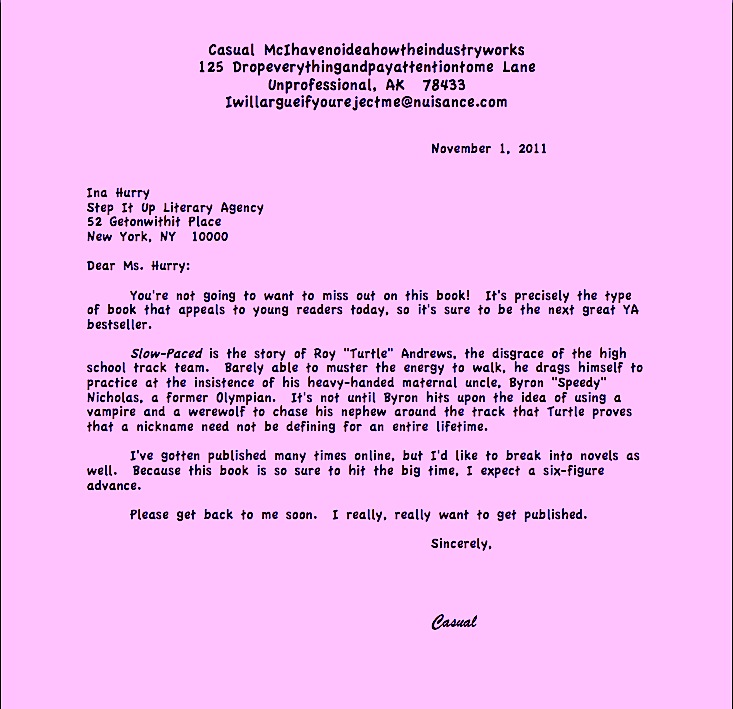

 Realistically, every English sentence a writer places under an agent or editor’s nose is a writing sample: the query, the synopsis, the bio, the book proposal. Every paragraph is yet another opportunity to show these people that you can write.
Realistically, every English sentence a writer places under an agent or editor’s nose is a writing sample: the query, the synopsis, the bio, the book proposal. Every paragraph is yet another opportunity to show these people that you can write.

